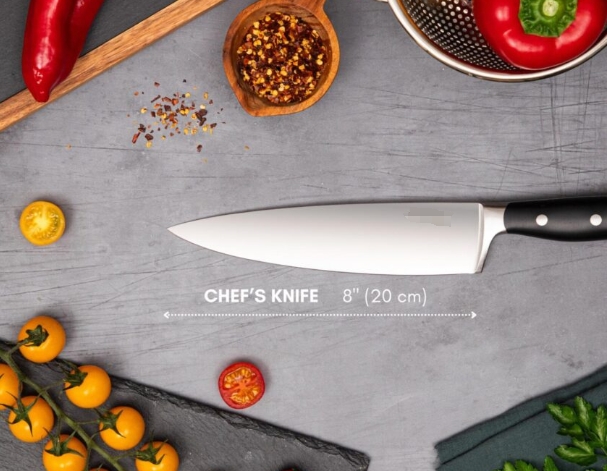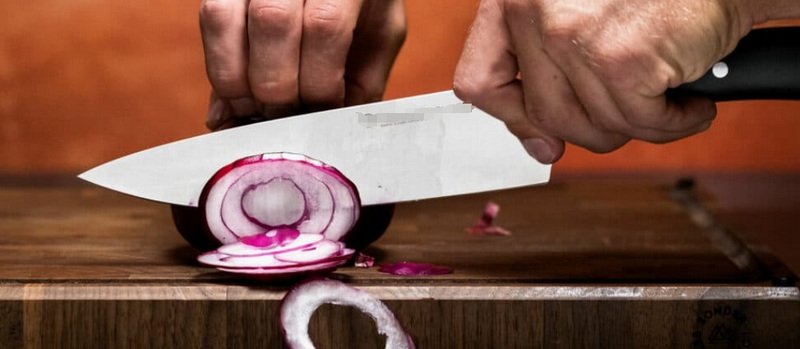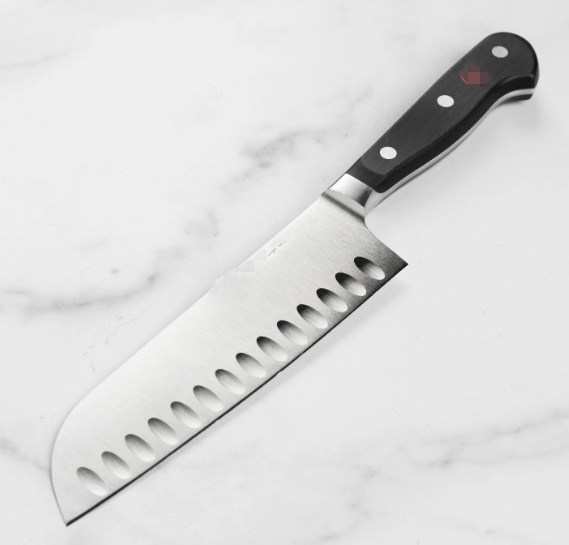

Views: 222 Author: Ella Publish Time: 2025-05-03 Origin: Site








Content Menu
● Understanding Knife Sizes and Their Uses
● Ideal Knife Set Composition for a Family Kitchen
>> Recommended Knives for a Family Kitchen
● How to Choose the Right Knife Size for Your Family Kitchen
>> Consider Hand Size and Comfort
● Choosing the Right Knife Material for Durability and Performance
● Ergonomics and Handle Design
● Maintenance and Safety Tips for Family Knife Sets
● Additional Tips for Family Kitchen Knife Use
● Frequently Asked Questions (FAQ)
>> 1. What is the best chef knife size for a family kitchen?
>> 2. How many knives should a family kitchen knife set include?
>> 3. Should I choose a larger or smaller knife blade?
>> 4. Are larger knife sets better for families?
>> 5. How do I maintain my kitchen knives?
Choosing the right knife set size for your family kitchen is essential for efficient, safe, and enjoyable cooking. A well-selected knife set can handle everything from simple vegetable chopping to preparing large family meals, while a poorly chosen set can make kitchen tasks frustrating and even hazardous. This comprehensive guide explores the ideal knife set size for a family kitchen, considering blade lengths, knife types, and set sizes, along with practical tips for selecting and maintaining your knives.

Knife size primarily refers to the blade length, which greatly affects control, comfort, and cutting efficiency. Chef knives typically range from 6 to 12 inches in blade length, with each size serving different kitchen needs.
- 6-inch knives excel at detailed and precise tasks like peeling, trimming, and fine slicing.
- 8-inch knives are the most versatile and popular choice for home kitchens, offering a balance between control and cutting surface for everyday tasks.
- 10-inch knives are suited for larger ingredients and batch cooking, providing longer, smoother cuts.
- 12-inch knives are often used by professionals for heavy-duty chopping and slicing large cuts of meat.
A family kitchen benefits from a knife set that covers various cutting needs without overwhelming storage space or budget. The size of the set and the variety of knives included should reflect your cooking habits and family size.
- Small Sets (2-4 pieces): Suitable for singles or small families, covering essential knives like a chef's knife, paring knife, and utility knife. Compact and budget-friendly, these sets handle basic cooking needs well.
- Medium Sets (5-8 pieces): Ideal for most family kitchens, these sets include a chef's knife, bread knife, carving knife, paring knife, utility knife, and kitchen shears. They provide versatility for a variety of meal preparations.
- Large Sets (10+ pieces): Designed for larger families or avid home cooks, these include steak knives and specialty knives, perfect for entertaining and diverse cooking styles.
- 8-inch Chef's Knife: The workhorse for chopping, slicing, and dicing.
- Bread Knife: Serrated blade for slicing bread without crushing.
- Paring Knife: Small blade for peeling and intricate work.
- Utility Knife: Mid-sized for miscellaneous tasks.
- Carving Knife: For slicing meats and roasts.
- Kitchen Scissors: Useful for cutting herbs, opening packages, and trimming.
The knife blade length should feel like a natural extension of your forearm, from wrist to elbow. This "forearm rule" helps ensure control and reduces fatigue. Smaller hands benefit from 6-7 inch blades, while larger hands may prefer 8-10 inches for better leverage.
- Frequent batch cooking or large meals: Larger blades (8-10 inches) provide efficiency.
- Detailed prep or occasional cooking: Smaller knives (6-7 inches) offer precision and ease of control.
Consider the countertop or drawer space available. Larger knife blocks with many knives require more room, while compact sets fit smaller kitchens better.

The material of your knives plays a crucial role in their durability, sharpness retention, and ease of maintenance. Common materials include stainless steel, high-carbon stainless steel, and ceramic.
- Stainless Steel: Resistant to rust and corrosion, easy to maintain, and generally affordable. However, it may require more frequent sharpening.
- High-Carbon Stainless Steel: Combines the best of both worlds with excellent sharpness retention and corrosion resistance. It is often preferred by professional chefs.
- Ceramic: Extremely sharp and lightweight, ceramic knives hold their edge for a long time but are more brittle and prone to chipping.
Comfortable handles reduce hand fatigue and improve control during prolonged use. Look for handles made from materials like wood, plastic, or composite, with ergonomic shapes that fit your hand well.
- Wood Handles: Offer a traditional look and good grip but require more care to prevent cracking.
- Plastic Handles: Durable and easy to clean, often textured for better grip.
- Composite Handles: Combine durability and comfort, often designed to be slip-resistant.
Proper storage not only protects your knives but also ensures safety in the kitchen. Consider these options:
- Knife Blocks: Classic and convenient, but can harbor bacteria if not cleaned regularly.
- Magnetic Strips: Save counter space and keep knives visible, but require secure mounting.
- Knife Rolls or Sheaths: Ideal for portability and protecting blades during storage.
- Keep knives sharp: Sharp knives reduce accidents by requiring less force.
- Store knives safely: Use knife blocks, magnetic strips, or protective sheaths to prevent damage and injuries.
- Hand wash knives: Avoid dishwashers to maintain blade integrity.
- Use proper cutting boards: Wooden or plastic boards preserve blade sharpness better than glass or stone.
- Regularly hone knives: Honing realigns the blade edge to keep it sharp between sharpenings.
- Teach family members knife safety: Proper handling reduces accidents, especially with children.
- Always use a cutting board to protect both your knives and countertops.
- Avoid cutting on hard surfaces like glass or stone, which dull blades quickly.
- Store knives out of reach of children or in locked drawers if necessary.
- Rotate knives in your set to prevent overuse of a single blade.
- Consider professional sharpening once or twice a year to maintain peak performance.
The ideal knife set size for a family kitchen balances versatility, comfort, and the types of meals you prepare. An 8-inch chef knife is the cornerstone of most sets, supported by a selection of 4 to 7 knives covering essential tasks like bread slicing, peeling, and carving. Consider hand size, cooking habits, and kitchen space when selecting your set. Proper maintenance and safe storage will extend the life of your knives and ensure a pleasant cooking experience for your family.

An 8-inch chef knife is generally the best size for a family kitchen because it offers a good balance of control and cutting surface for most tasks.
A set with 5 to 7 knives usually covers all essential tasks, including a chef's knife, bread knife, paring knife, utility knife, carving knife, and kitchen scissors.
Choose a blade length that matches your forearm length for comfort and control. Smaller blades (6-7 inches) are better for precision and smaller hands, while larger blades (8-10 inches) suit bigger hands and larger meal prep.
Larger sets offer more knife varieties and steak knives, which can be useful for big families or entertaining, but they require more storage space and may be unnecessary for everyday cooking.
Keep knives sharp, hand wash them, store safely in blocks or on magnetic strips, and use appropriate cutting boards to preserve blade quality and ensure safety.